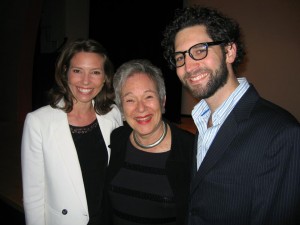
Pearlman has clearly given the subject plenty of thought. “Am I a Jewish American Writer, a Jewish American Female Writer, a Jewish American Female Writer bred in New England and therefore part Yankee?” “Am I a writer who writes on Jewish subjects or a Jewish writer who writes on many subjects?” she asks. The author notes the many questions of identity that she grapples with as a so-called Jewish writer. “I am proud and honored that my stories are considered good for the Jews.” “I am interested in Jewish life in the diaspora and Jewish life in Israel,” she says. She spent a year living in Jerusalem in the late 1990s. Pearlman, a mother of two who says she had a limited conventional Jewish upbringing, had no previous connection to Hadassah, and was “both pleased and surprised to win Prize,” she says. “About a year after that story came out,” Pearlman recalls, “I used Francis’s words in a Boston Globe op-ed about Brookline.” When a friend accused her of plagiarizing herself, her response was telling: “Francis speaks for me.” I see the Commonwealth as an extension of myself-its public gardens my flower patch, its public libraries my bookshelves, its police my bodyguard, its ball team my sandlot, its state hospitals my mad aunt.” The man, Francis, tells his young protégée: “I identify with the Commonwealth. In one story in the collection, “Girl in Blue with Brown Bag,” an elderly Godolphin man tutors a Russian teenager in American history. “But I have altered it, added to it, distorted it, repeopled it, so that it no longer belongs to the citizens of Brookline, it belongs to me.” “On the map, Godolphin is exactly coincidental with Brookline,” she explains. The author, originally from Providence, Rhode Island, sets many of her stories in the fictional New England town of Godolphin. Ribalow Prize, given annually to a work of fiction on a Jewish theme, for her highly acclaimed book Binocular Vision: New & Selected Stories (Lookout Books). Pearlman is the winner of the 2012 Harold U. However, the thoughtful writer clearly does not take herself too seriously. Her stories deal with weighty ideas-exile and loyalty, the Jewish diaspora-through narratives about very ordinary individuals. While the parallel is, perhaps, not obvious to most, one is not surprised to hear it from the septuagenarian author.

It has “many of the charms” of the French metropolis, she says, “but storekeepers don’t look down their noses at you and there is little crime.”


Edith Pearlman compares the Boston suburb that she calls home-Brookline, Massachusetts-to Paris.


 0 kommentar(er)
0 kommentar(er)
